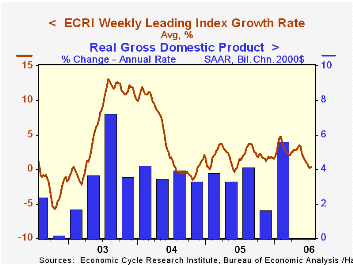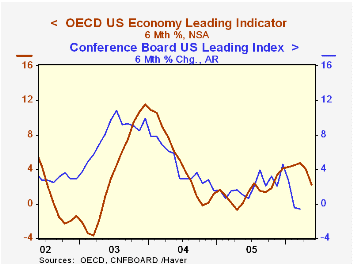 Global| Jul 24 2006
Global| Jul 24 2006ECRI Leading Index Flat During 2006
by:Tom Moeller
|in:Economy in Brief
Summary
The weekly leading index of the US economy published by the Economic Cycle Research Institute (ECRI) was unchanged in the latest week, a performance which typifies the index's movement during 2006. Versus its year end 2005 level, the [...]

The weekly leading index of the US economy published by the Economic Cycle Research Institute (ECRI) was unchanged in the latest week, a performance which typifies the index's movement during 2006.
Versus its year end 2005 level, the leaders are up a scant 0.8% while the six month growth rate of 0.3% is down from this year's high of 4.8%.
During the last ten years there has been a 53% correlation between the change in the weekly leading index and US real GDP growth during the following quarter. The correlation has risen to 71% during the last five years.
The slowdown mirrors the pattern of slower growth in the leading series of the US economy from the Conference Board and the OECD. Reduced economic liquidity as suggested by a flat interest rate yield curve and slower growth in the money supply, as well as lower housing market activity, account for much of the slowdowns.
Real GDP growth for the U.S. in 2Q is scheduled for release this coming Friday and it is generally expected at 3.0% (AR) versus 5.6% growth during 1Q.
Residential Investment over the Real Estate Cycle from the Federal Reserve Bank of San Francisco is available here.
The daily liquidity effect from the Federal Reserve bank of St. Louis can be found here.
Visit the Economic Cycle Research Institute for analysis of US and international business cycles.
| Economic Cycle Research Institute | 7/14/06 | 12/30/05 | Y/Y | 2005 | 2004 | 2003 |
|---|---|---|---|---|---|---|
| Weekly Leading Index | 136.9 | 135.8 | 1.6% | 134.6 | 132.6 | 124.9 |
| 6 Month Growth Rate | 0.3% | 1.5% | 1.9% | 4.2% | 6.7% |
Tom Moeller
AuthorMore in Author Profile »Prior to joining Haver Analytics in 2000, Mr. Moeller worked as the Economist at Chancellor Capital Management from 1985 to 1999. There, he developed comprehensive economic forecasts and interpreted economic data for equity and fixed income portfolio managers. Also at Chancellor, Mr. Moeller worked as an equity analyst and was responsible for researching and rating companies in the economically sensitive automobile and housing industries for investment in Chancellor’s equity portfolio. Prior to joining Chancellor, Mr. Moeller was an Economist at Citibank from 1979 to 1984. He also analyzed pricing behavior in the metals industry for the Council on Wage and Price Stability in Washington, D.C. In 1999, Mr. Moeller received the award for most accurate forecast from the Forecasters' Club of New York. From 1990 to 1992 he was President of the New York Association for Business Economists. Mr. Moeller earned an M.B.A. in Finance from Fordham University, where he graduated in 1987. He holds a Bachelor of Arts in Economics from George Washington University.
More Economy in Brief
 Global| Feb 05 2026
Global| Feb 05 2026Charts of the Week: Balanced Policy, Resilient Data and AI Narratives
by:Andrew Cates






